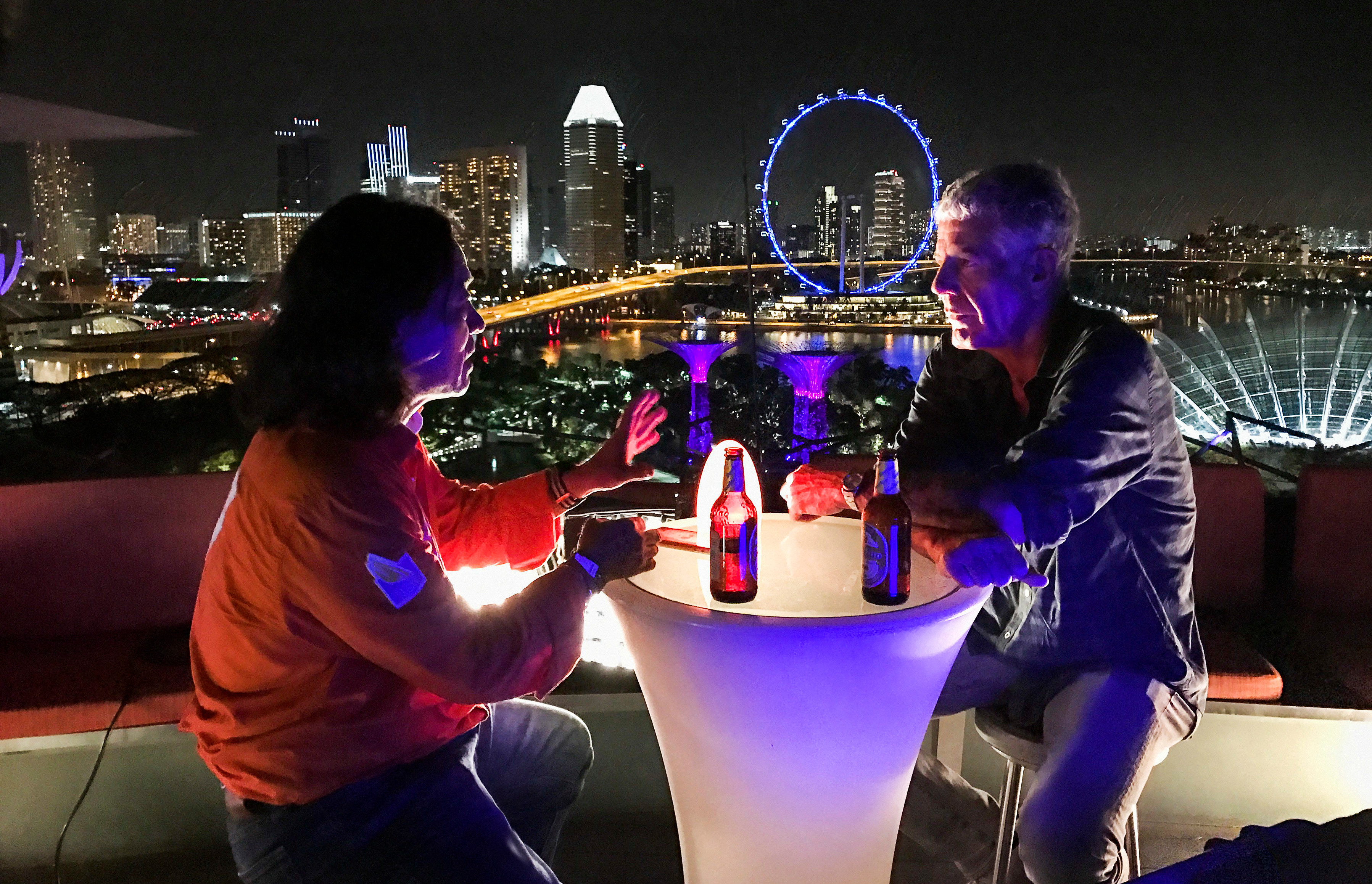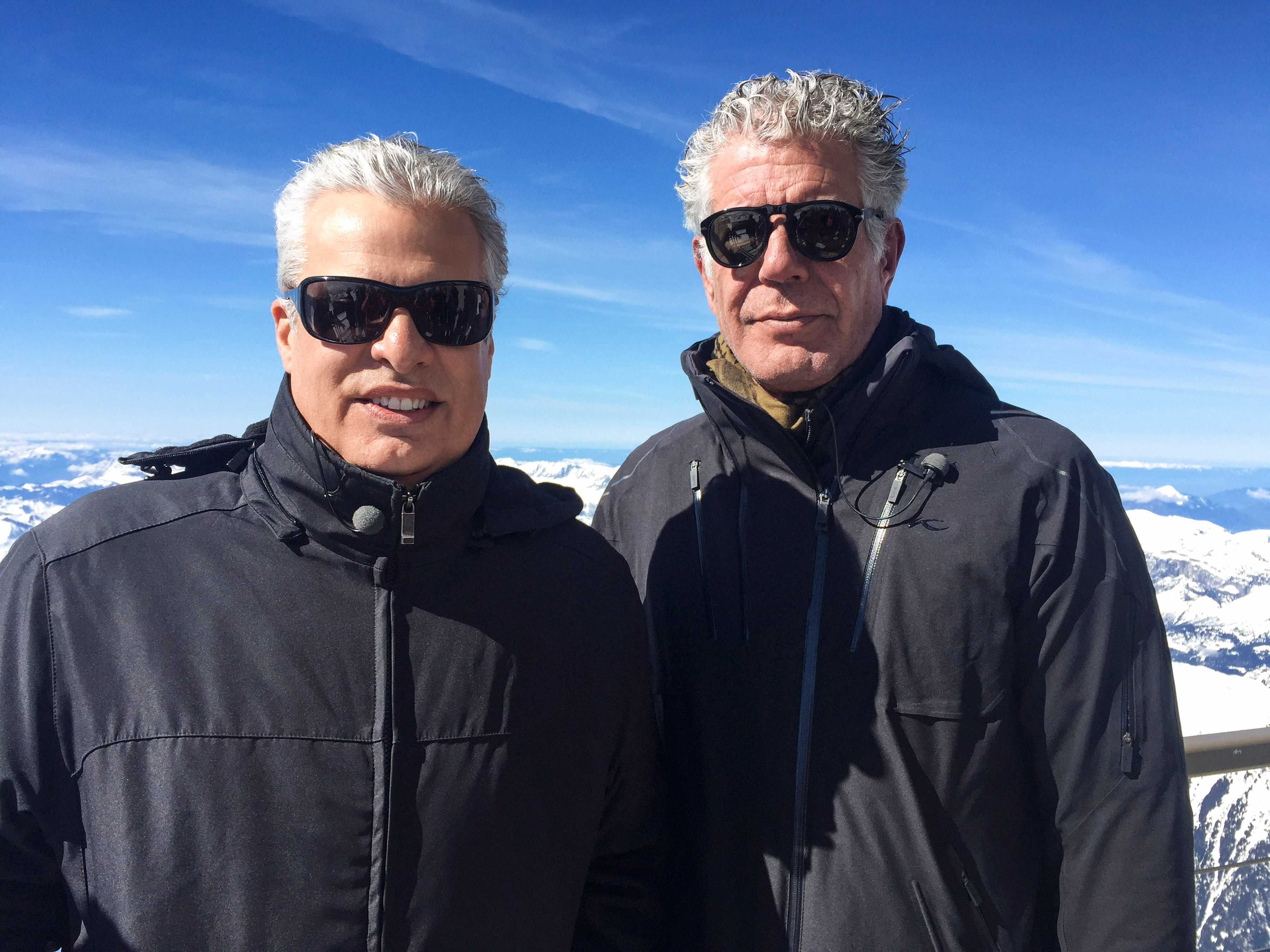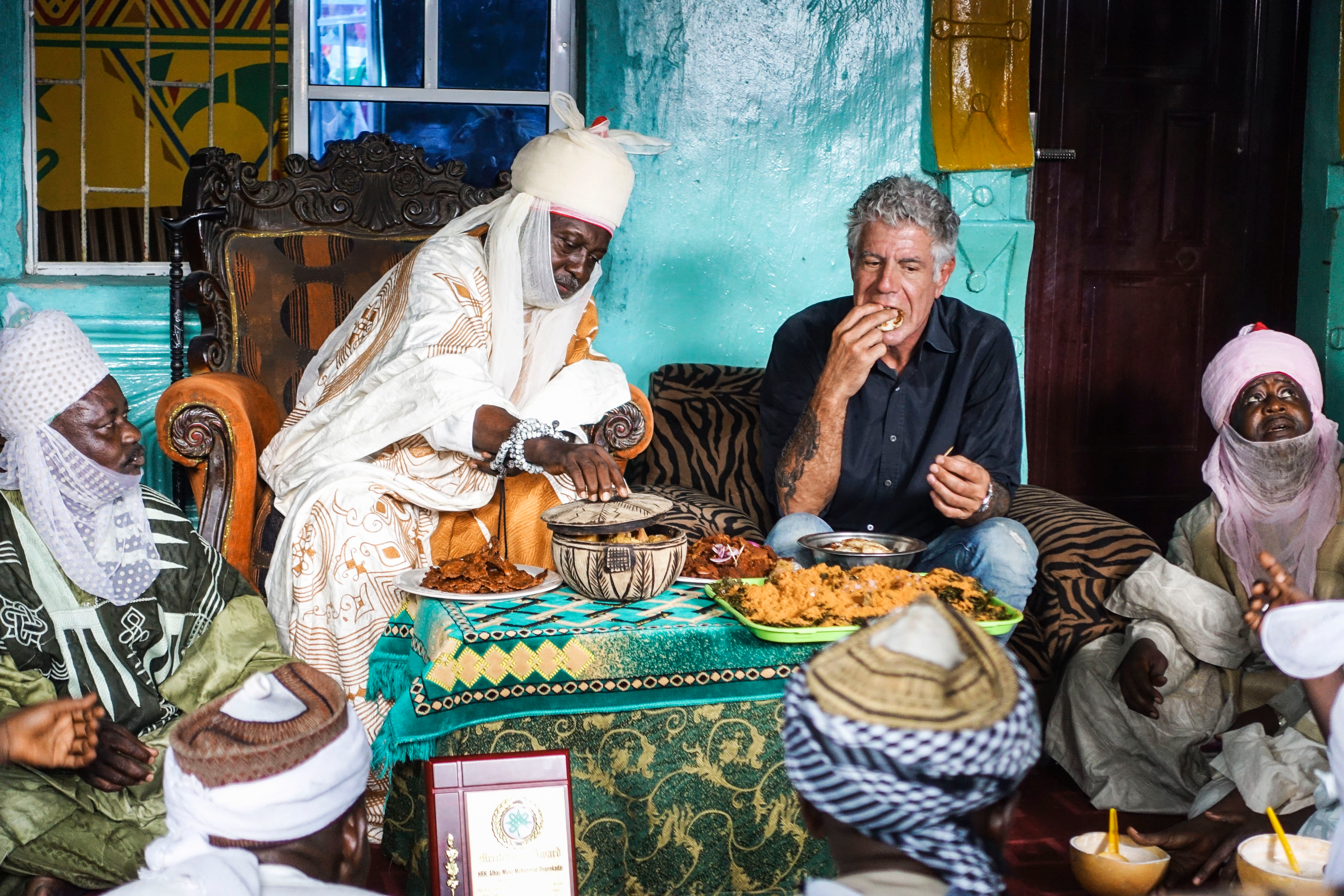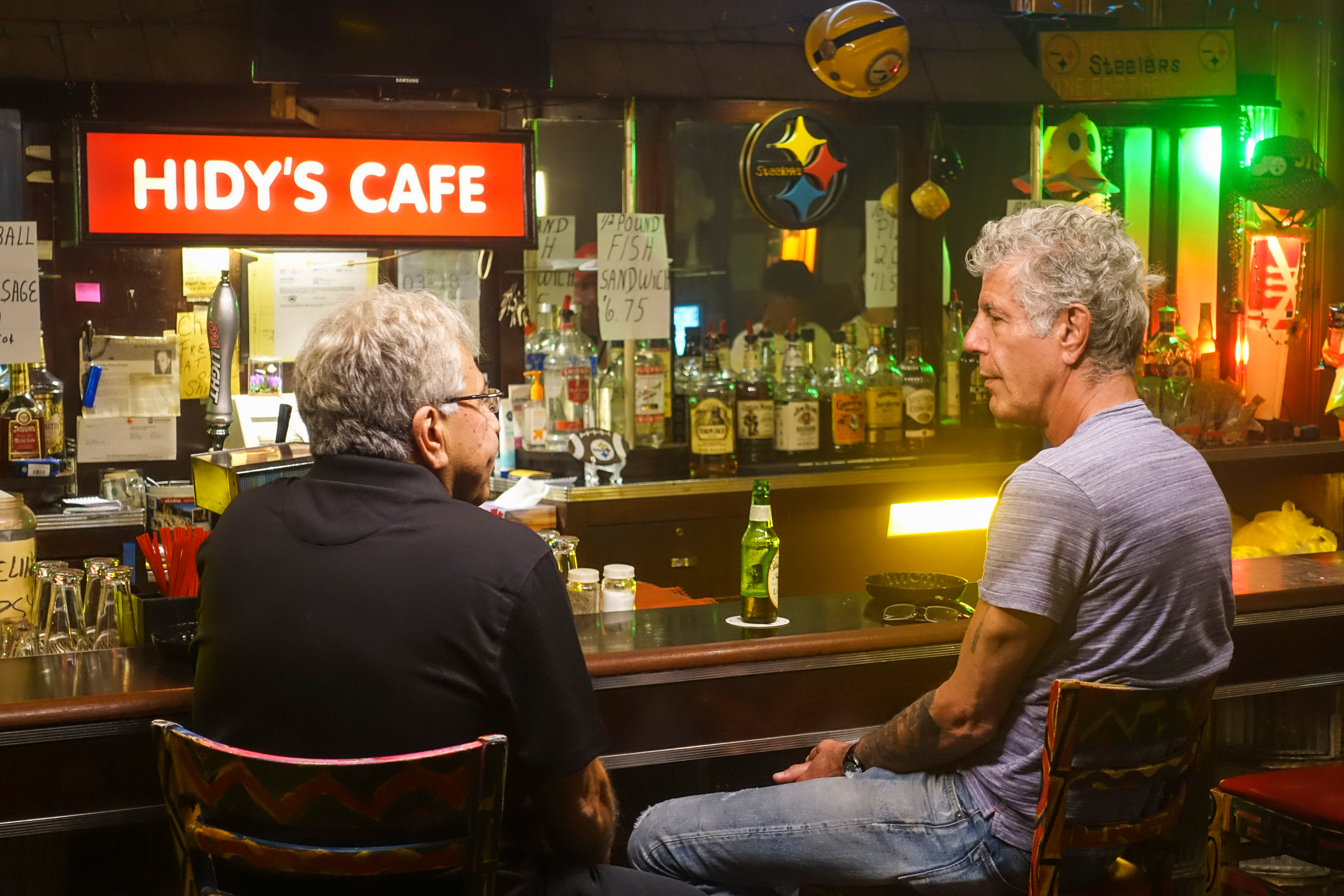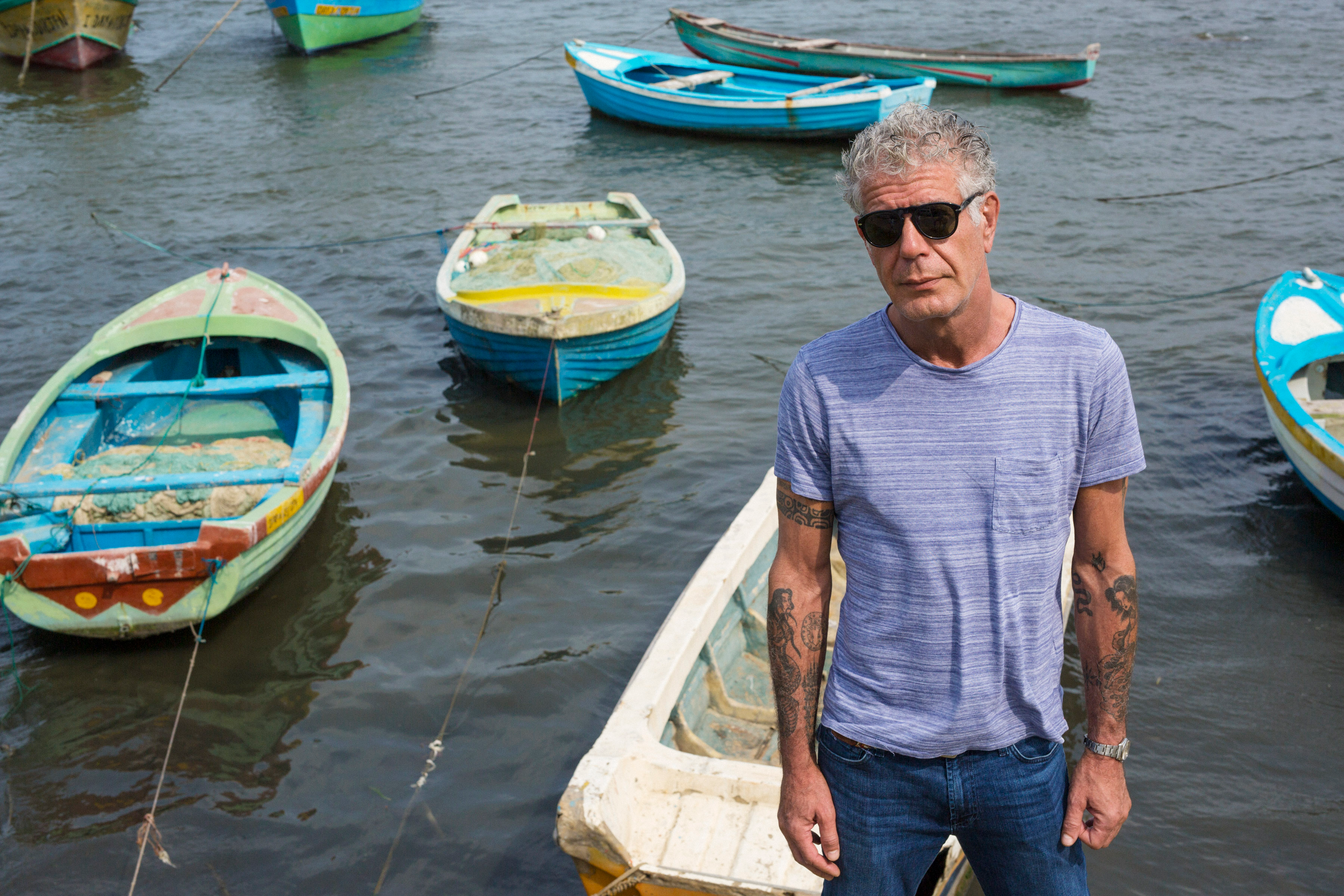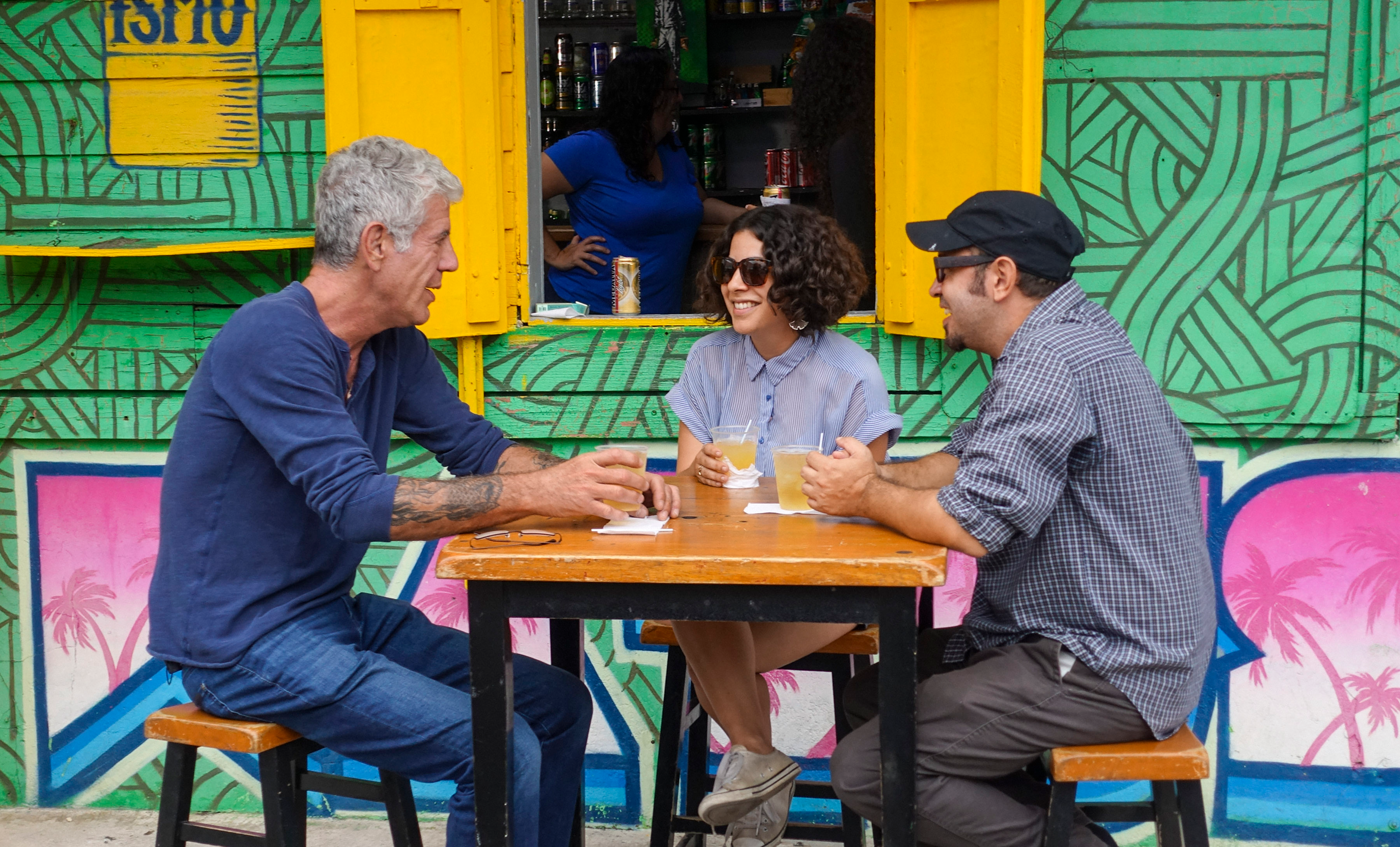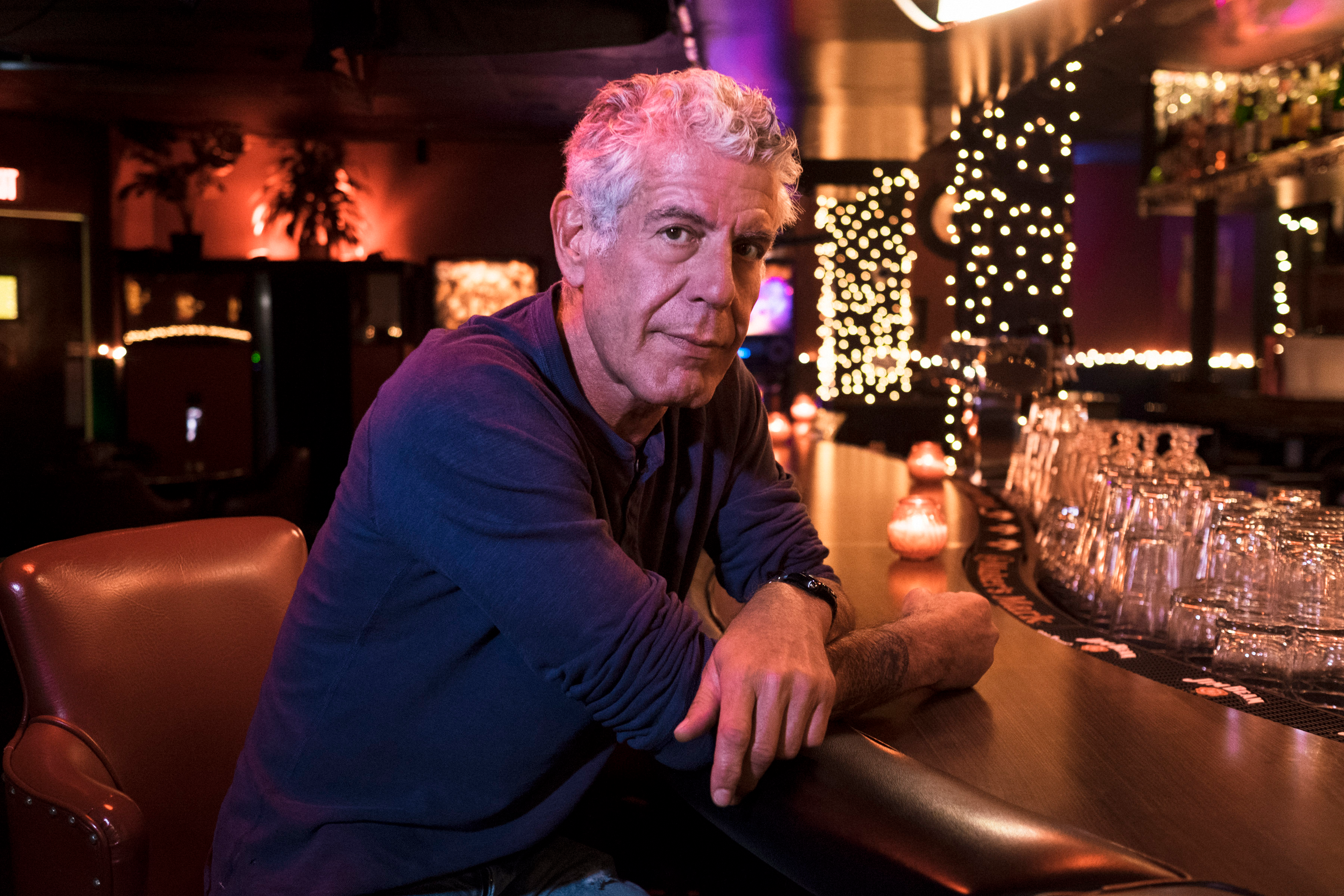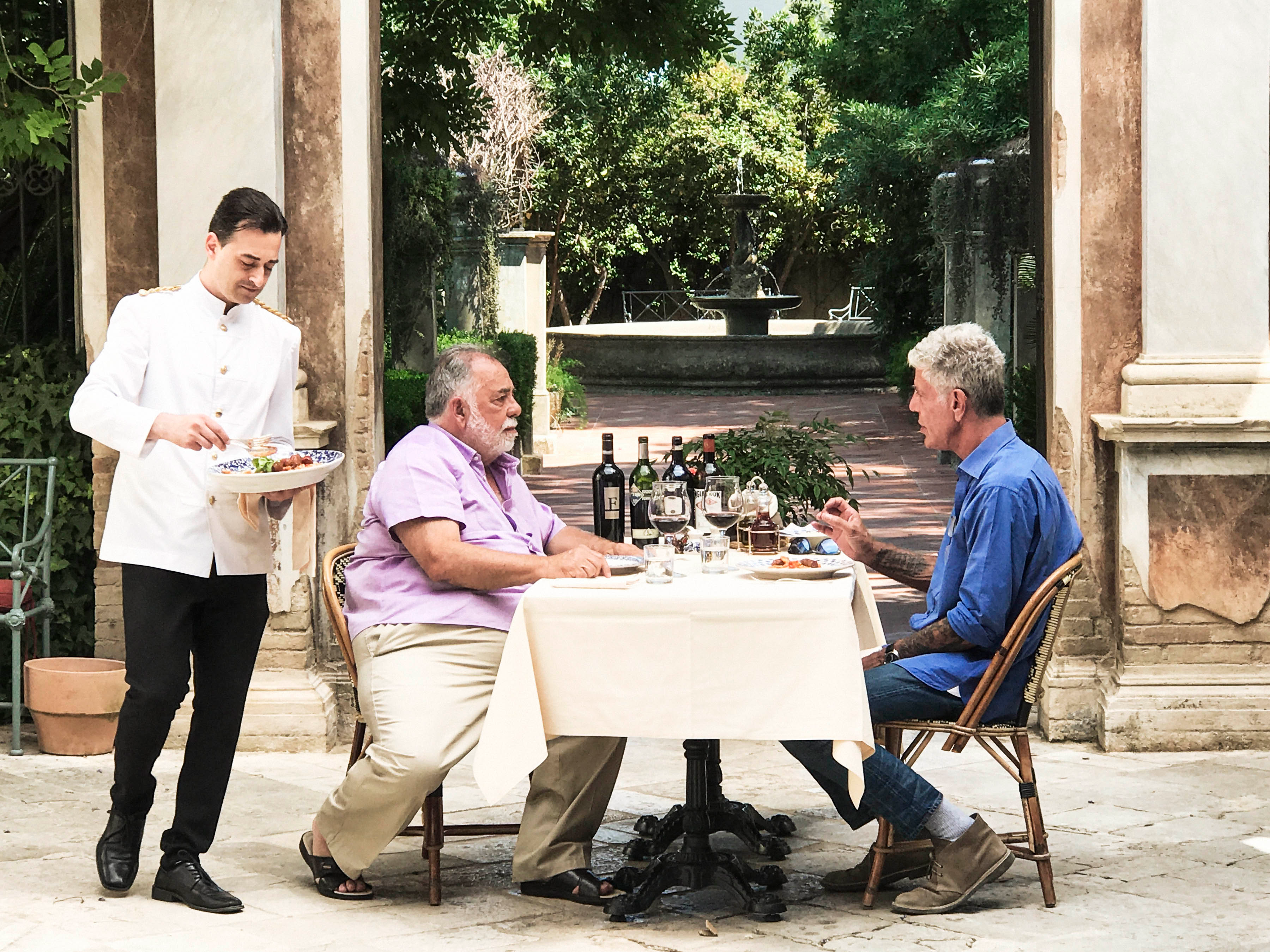Parts Unknown, Season 10: What Makes A Good Heel
The striking cinematography of "Lagos," the sharp-edged rock of "Seattle," and the food (the food!) of "Puerto Rico" and "Singapore" are all delightful and intoxicating. But know this: Not one thing in any is as delicious as the Revenge.... Of Ripert!
Episode 1: Singapore
The itinerary: To include a separate section on food for this episode seems almost foolish. There's food everywhere. As Bourdain tells us in voiceover, "I come here mostly to eat, because that's what they do here. And they arguably do it better—with more diverse, affordable food options per square foot than just about anywhere on Earth." But here's "Singapore," a fiendishly clever, spoonful-of-sugar kind of episode, in a nutshell: Bourdain brings three Singaporeans out for oyster omelets, beef satay, fried prawns with chili paste, and fish ball soup. The camera captures the dishes, the mouthfuls, with a gaze that's almost lascivious. And all the while, they talk about heady stuff. The cost of living in a police state. The cost of freedom of speech. Independence. Gender parity. Later, the episode will juxtapose exquisite cocktails and legalized prostitution with cameras watching in every car and on every corner. It would seem that Bourdain and the Singaporean government alike understand that when you placate people with indulgences, you can accomplish things much less palatable.
Looks delicious: Everything qualifies here, but Bourdain saves one of his favorite dishes—char kway teow, a stir-fried rice noodles typically cooked in pork fat—for last, and it's a hearty, drool-inducing showstopper.
Episode 2: The French Alps
The itinerary: Remember when Bourdain took chef/buddy cop Eric Ripert to Sichuan to watch him politely sweat his way through insanely spicy dishes and glass after glass of potent booze? Here, Ripert gets his revenge—though it won't look like it, until you see Bourdain's face. The pair journeys to the French Alps to ski, eat cheese, drink, eat more cheese, hike through snow-covered mountains and finish it all off with some cheese. But somewhere along the way, Bourdain gets it in his head that Ripert should really be at the center of an action movie, and while life remains peaceful, the episode gets stranger from there.
Looks delicious: The raclette sliced as it melts from the heat of what's essentially a small copper portable cheese radiator is the stuff of dreams, but the farcon—a steamed potato loaf filled with bacon and dried fruit—will make you want to grab your parka and head for the airport tout suite.
> Read more about "The French Alps" in our list of Parts Unknown's most essential episodes.
Episode 3: Lagos
The itinerary: This is one of the most visually dynamic episodes of Parts Unknown—a textured, vivid, deftly edited piece of television. Shot in no small part on 16mm film, the episode's rich, deeply saturated colors, grainy quality, and energetic editing distinguish it; but if the style didn't suit the subject, it would be an affectation, a piece of cinematic showboating and nothing more. That's not the case. Director Morgan Fallon, a frequent cinematographer for the series (as well as for No Reservations), seemingly aims to replicate the tireless hustle and bubbling enthusiasm of the city with his filmmaking, a combination that makes the unforgettable places Bourdain visits—the bustling Computer Village, floating "city within a city" Makoko—even more vibrant. The extra effort is appropriate for an episode focused on people determined to make a better life not just for themselves, their families, and their communities, but for their country, and for the world at large.
Looks delicious: One of the purest Bourdain quotes about a dish arrives in this episode: "Pepper soup is the food of the night and dark places. It burns. It burns real good."
Programming note: There are many Parts Unknown episodes in which the music is a fundamental piece of the storytelling, but even among that crowded field, "Lagos" stands out. You can hear much of what's featured in this playlist, and read more on the music here and here.
Episode 4: Pittsburgh
The itinerary: Prepare for some big, fat conversations, often over big, fat meals. In Pittsburgh, Bourdain talks to the locals about what's foremost in their minds. Sometimes that's the virtues of professional wrestling, and the qualities necessary to make a good heel (Bourdain, he's told, has them). More often, it's gentrification, change, the legalization of marijuana, culture, community, aging, abandonment, civic duty, and the like. As with episodes like "Detroit" and "Montana," the show makes its respect for the people who live in these changing, sometimes struggling communities apparent, and does not attempt to provide easy answers to any of the questions raised. But "Pittsburgh" ends with something that feels curiously like an answer of a sort. The episode asks if Pittsburgh can stay Pittsburgh as the future knocks on the door; it concludes with a good old-fashioned demolition derby, in which one of the prizewinners is the community's only female driver. That's the future, but in the best way, it still looks and feels like the past.
Looks delicious: Bourdain travels to the Pittsburgh suburb of Braddock for a meal with the city's mayor and others at the not-then-opened Superior Motors, a supremely elegant meal that seems to more than make up for the mournful sight of gorgeous sausages and peppers strewn over the pavement in the episode's earliest scenes.
Episode 5: Sri Lanka
The itinerary: A decade after No Reservations first took Bourdain to Sri Lanka, he returns to find both great change and ever-present history. The ghosts roam. They could also, as theater artist Tracy Holsinger of Mind Adventures Theatre Company fears, be ignored by a country still living with the wounds of a decades-long conflict that saw thousands die, or simply vanish. "The first time I went to Sri Lanka, 10 years ago, nobody talked—not about the important things," Bourdain writes in his indispensable episode notes. They were too afraid. During that visit, the No Reservations crew was not permitted to travel north; the Parts Unknown team climbs aboard a train and makes their way to Jaffna, to find more absence, more ghosts, more people living in a world shaped by a terrible past. Now, they can speak. Some do—among them, the artists of that theater company, whose evocative, full-throated work weaves through the episode and adds a streak of visceral emotion that dares you to look away.
Looks delicious: Bourdain calls Jaffna crab curry "the holy grail of Sri Lankan cuisine," and it's easy to see why. It's one of several home-cooked meals that simply look so fragrant that it's easy to imagine the aroma of the spices wafting off the screen.
Programming note: If you, like this writer, find yourself shamefully uninformed about the Sri Lankan Civil War, this piece, from Parts Unknown's supplemental website, is a fantastic place to start.
Episode 6: Puerto Rico
The itinerary: When the Parts Unknown team touched down in Puerto Rico, they found blue skies, beautiful beaches, drinks screaming out for little umbrellas, and food—especially seafood—that will make your tongue roll out of your mouth like a carpet while your eyes make a crazy a-woo-ga noise as they careen from their sockets. They also found a crippled economy, a beach strewn with uranium and undetonated explosives, and people willing to stand in front of bulldozers to keep the landscape from succumbing to mega-resorts springing up in the name of economic development. This was months before Hurricane Maria; the episode aired weeks after, beginning with a shot of a city under water. What's most striking about this episode isn't that gorgeous seafood. It's that Parts Unknown was determined to show audiences a beautiful place that, metaphorically, was drowning, well before the storm swept in. It's an hour tinged with respect, affection, and anger, all mingling in a particularly memorable conversation with teacher Liza Fournier Cordova, whose eyes fill as she tells Bourdain that she knows she can't save all her students. "But I can save a lot," she says, lifting her chin. "And that's my job."
Looks delicious: Bourdain's trip includes many beautiful meals—feasts of coconut arepas, slow-roasted pig, mofongo, stews, fritters, and endless seafood—but the meal of fresh-caught grouper and red snapper with an encampment of protestors will send you scrambling for waders and a pole.
Programming note: The Parts Unknown digital team really went above and beyond with this episode, publishing work by several of the hour's guests under the title "Life After Maria," including one by Cordova.
Episode 7: Seattle
The itinerary: If you're looking for a feel-good episode of Parts Unknown, it might seem odd to start with an episode in which Bourdain is fixated on the region's rate of serial-killers-per-capita. But enthusiasm can be infectious, and this is a place that Parts Unknown tackles with relish. The episode begins with discussion of the locust-like descent of Tech Boys (captured in a real sick burn of a pop tune by The Gods Themselves), an unwelcome development, but the people Bourdain meets clearly enjoy their indignation and methods of protest; it ends with a mournful yet enjoyable nostalgia, and the pleasure of rolling a joint in solitude. And the music—god, the music.
Looks delicious: Apologies to the raw oysters, but the tiny pop of the canned bread at Modernist Cuisine is an instantly unforgettable, joyful, surprising moment.
Episode 8: Southern Italy: The Heel of the Boot
The itinerary: Near the beginning of this evocative episode, Bourdain interviews Francis Ford Coppola in the sun-drenched courtyard of his boutique hotel—a mansion which, in the days of Mussolini, belonged to the podesta—and while they feast on some exquisite-looking dishes, Coppola talks about the unexpected shame and embarrassment that arrived with the unexpected success of The Godfather. It's a hell of an interview, exquisitely shot by director Tom Vitale on Panavision cameras; the reds are so red, the whites, so white. And somehow, it's not downhill from there. This is one of the best-looking episodes of Parts Unknown, an evocative outing that's as rich thematically as it as visually.
Looks delicious: The first thing Bourdain eats in this episode is uni pasta. "In the annals of food," he says, "this is a divisive dish—basically anything with ricci, also known as uni—we call it sea urchin roe [is divisive]." He goes on to call it "one of the greatest things on Earth." It straight-up drives him back to smoking a lone cigarette, and even then, he's not done. Listen for that final, deeply satisfied, "Goddamn."
Programming note: This is one of several episodes of the series that prominently features Asia Argento.
